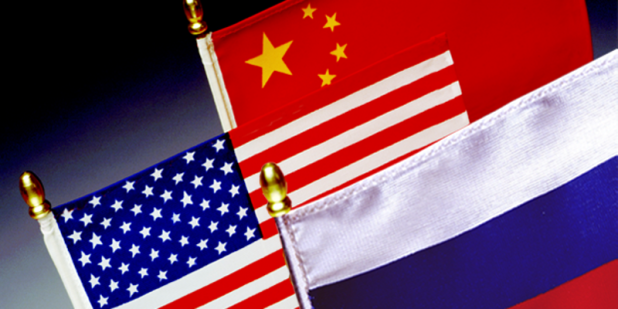Join us for a free one-day workshop for educators at the Japanese American National Museum, hosted by the USC U.S.-China Institute and the National Consortium for Teaching about Asia. This workshop will include a guided tour of the beloved exhibition Common Ground: The Heart of Community, slated to close permanently in January 2025. Following the tour, learn strategies for engaging students in the primary source artifacts, images, and documents found in JANM’s vast collection and discover classroom-ready resources to support teaching and learning about the Japanese American experience.
United States, China, and Russia: Relations Between The World’s Great Powers in the Trump Era
Dr. Henry Kissinger said that President Nixon "created a set of international policies whose main outlines survive to this day." One of the most important is triangulation; by improving relations with China, the U.S. carved out favorable negotiating positions with the Soviet Union --- while improving relations with both countries.
Where

Dr. Henry Kissinger said that President Nixon "created a set of international policies whose main outlines survive to this day." One of the most important is triangulation; by improving relations with China, the U.S. carved out favorable negotiating positions with the Soviet Union --- while improving relations with both countries.
Is the concept of triangulation between China, Russia and the U.S. still relevant in today's world, and what can Americans expect the Trump administration's policies toward Russia to be?
Karl Eikenberry is the Oksenberg-Rohlen Fellow, Director of the U.S.-Asia Security Initiative and faculty member at the Shorenstein Asia-Pacific Research Center, Stanford University. He is a Stanford University Professor of Practice, and an affiliate at the FSI Center for Democracy, Development, and Rule of Law, Center for International Security Cooperation and The Europe Center. Prior to his arrival at Stanford, he served as the U.S. Ambassador to Afghanistan from May 2009 until July 2011, where he led the civilian surge directed by President Obama to reverse insurgent momentum and set the conditions for transition to full Afghan sovereignty.
Thomas Fingar is a Shorenstein APARC Fellow and was the inaugural Oksenberg-Rohlen Fellow in the Freeman Spogli Institute for International Studies at Stanford University. He was the Payne Distinguished Lecturer at Stanford during January to December 2009. From May 2005 through December 2008, he served as the first deputy director of national intelligence for analysis and, concurrently, as chairman of the National Intelligence Council. He served previously as assistant secretary of the State Department’s Bureau of Intelligence and Research (2004–2005), principal deputy assistant secretary (2001–2003), deputy assistant secretary for analysis (1994–2000), director of the Office of Analysis for East Asia and the Pacific (1989–1994), and chief of the China Division (1986–1989).
David Holloway is the Raymond A. Spruance Professor of International History, a professor of political science, and an FSI senior fellow. He was co-director of CISAC from 1991 to 1997, and director of FSI from 1998 to 2003. His research focuses on the international history of nuclear weapons, on science and technology in the Soviet Union, and on the relationship between international history and international relations theory. His book Stalin and the Bomb: The Soviet Union and Atomic Energy, 1939-1956 (Yale University Press, 1994) was chosen by the New York Times Book Review as one of the 11 best books of 1994, and it won the Vucinich and Shulman prizes of the American Association for the Advancement of Slavic Studies.
Kathryn Stoner, Moderator, is is a Senior Fellow at the Freeman Spogli Institute for International Studies at Stanford University and at the Center on Democracy, Development, and the Rule of Law, as well as (since 2010) the Faculty Director of the Ford Dorsey Program in International Policy Studies at Stanford University.
Featured Articles
Please join us for the Grad Mixer! Hosted by USC Annenberg Office of International Affairs, Enjoy food, drink and conversation with fellow students across USC Annenberg. Graduate students from any field are welcome to join, so it is a great opportunity to meet fellow students with IR/foreign policy-related research topics and interests.
RSVP link: https://forms.gle/1zer188RE9dCS6Ho6
Events
Hosted by USC Annenberg Office of International Affairs, enjoy food, drink and conversation with fellow international students.
Join us for an in-person conversation on Thursday, November 7th at 4pm with author David M. Lampton as he discusses his new book, Living U.S.-China Relations: From Cold War to Cold War. The book examines the history of U.S.-China relations across eight U.S. presidential administrations.




